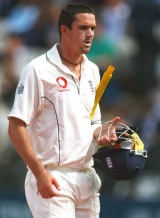Justice for some
Despite great advances in technology it is still the case that the bulk of the decisions are best decided from on the field
Ian Chappell
22-Jul-2007
|
|

|
When the subject of third-umpire referrals was first raised in the 1990s, my initial concern was that it would result in a system of justice for some but not for all.
My fears were confirmed on a storm-affected second day at Lord's. At the self-appointed "home of cricket", Kevin Pietersen walked after being given out caught behind, but then turned on his heel and returned to the crease following a television replay and advice from outside the playing field that the catch was not "clean".
There is a certain irony in the fact that a basic tenet of the game was violated at the ground where the catchphrase "It's not cricket" could well have been conceived. As a young cricketer, the first thing you learn is the correct grip, closely followed by "the umpire is always right." In this case, it turned out umpire Simon Taufel was not correct, but it was a mistake born of the best intentions.
A few years ago the affable Taufel told me: "I'm like the players. I want to test myself." He was referring to his tendency to adjudicate on appeals rather than rely heavily on confirmation from the third umpire. It is that pride in making correct decisions that has seen Taufel stand out from his fellow arbiters, resulting in him three times being voted the ICC's Umpire of the Year. He is to be commended for his desire to make his own decisions, but his resolve to continue doing so will now be weakened by what happened at Lord's on a day when the wild weather didn't create the biggest storm.
The fact that a few hours later Taufel did call on the third umpire to decide a clear-cut run-out decision involving India's night-watchman RP Singh, was confirmation that the "Pietersen affair" had temporarily shaken his nerve.
Ironically, the incorrect Pietersen decision would have been satisfactorily resolved under the old system. I suspect the square-leg umpire Steve Bucknor either knew the ball hadn't carried to keeper Mahendra Singh Dhoni, or was sufficiently enough concerned to convince Taufel to change his mind and give Pietersen the benefit of the doubt.
|
|
Third-umpire referrals were introduced to protect the umpire. It was felt that technology provided the television viewer with so much more information that umpires were likely to be lambasted if the playing field wasn't levelled and the adjudicator given the benefit of all the available evidence. The sentiment is worthy, but like so many decisions taken by cricket administrators it wasn't properly thought through.
Much of what is provided by television isn't tangible evidence; it is actually a tool to enhance the viewers' entertainment. Television replays shouldn't be used as evidence of an umpire's failings or to judge his worth as a participant at the highest level.
Despite great advances in technology it is still the case that the bulk of the decisions are best decided from on the field. Hence my original concern, that the referral system would provide justice for some but not for all, still applies. For instance, we saw Pietersen reprieved at Lord's, but where is the recourse for a bowler who feels his appeal has not been given a fair hearing? He doesn't have any. The system only provides justice for some, but there's no denying the game is at its best when the contest between bat and ball is evenly balanced.
Much of the conflict between opposing players on a cricket field is caused by incompetent umpiring. The referral system will lead to a general lowering of standards, as the basis of good umpiring is a desire to make decisions and a conviction that they are nearly always correct. Certainly the injustices of the referral system will inspire further rancour in bowlers, and heaven knows they have long been the second-class citizens of the game.
As a young cricketer the third thing you learned, after the grip and the umpire is always right, is: all wickets from one to ten are equal in value. That is no longer the case and that premise is now about as meaningful as the saying "It's not cricket".